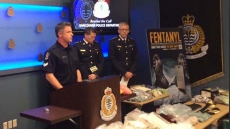A large whale has become tangled in fishing gear off southeast Newfoundland, raising fears it will die before it can shed the equipment or rescuers can remove it.
"This is what we call heavy fishing gear, it's heavy rope, strong rope," said Wayne Ledwell of the Whale Release and Strandings group in Portugal Cove - St. Philip's, N.L.
"If it doesn't shed the gear or if we don't take the gear off, then it could probably die ... (from the) stress and energy that it needs to carry around all this fishing gear, and not be able to feed properly and get into areas where it needs to feed."
Ledwell said a tour boat spotted the whale, believed to be a humpback, at Witless Bay on the southern Avalon peninsula Saturday, carrying rope possibly through its mouth or fin, and a snow crab pot buoy. His group responded to the area but couldn't find it.
"We had a large search pattern and didn't see it. Ideally it would show up in a cove somewhere that's protected from wind and people would … let us know and then hopefully we can do something about it," he said. "I know from the picture there's quite a large amount of fishing gear underneath his body that it's towing."
Ledwell said boaters should stay away from the whale and not try to disentangle it, because they might remove a highly visible buoy but not all the equipment, making it difficult to spot and fully rescue.
Also, he said, it's dangerous to the boaters.
"The risk is, if boaters see a whale … their propeller or their engine could get caught in that rope, and especially in smaller-type boats, that would be pretty much disastrous because the whale could just tow the boat under. It could easily do that."
According to a Marine Mammal Science report, around 1,200 large whales were found entangled in gear between 1979 and 2008, the vast majority of them humpbacks.
Ledwell, who contributed to the study, said his group gets a few dozen calls a year - sometimes they find it and rescue it, and sometimes they don't.
"When the whale is towing gear it can go anywhere and they got fins and a tail and the ocean is big so we may not see them again for a while," he said.
"Hopefully if someone sees it again they'll let us know."




